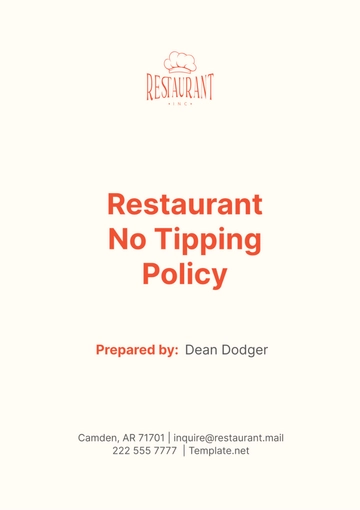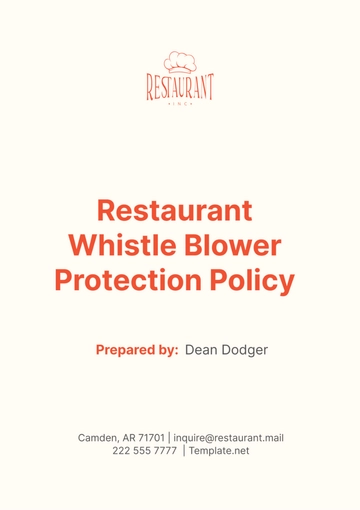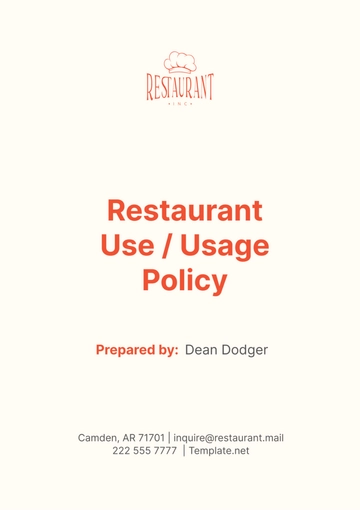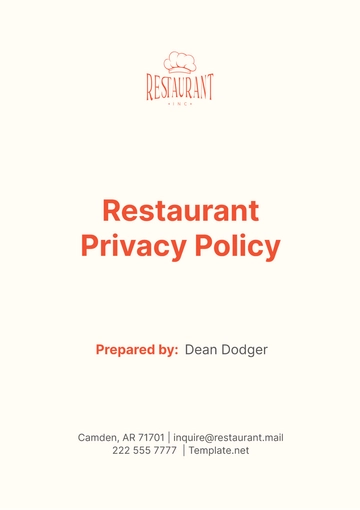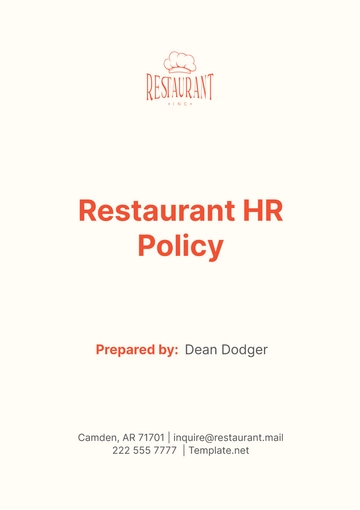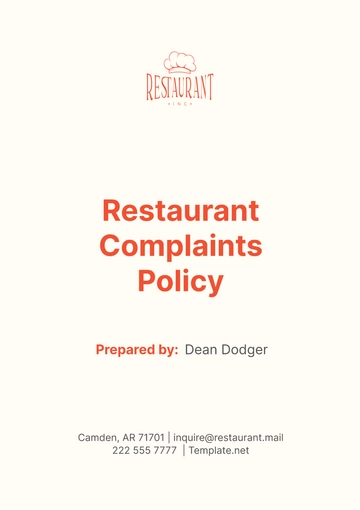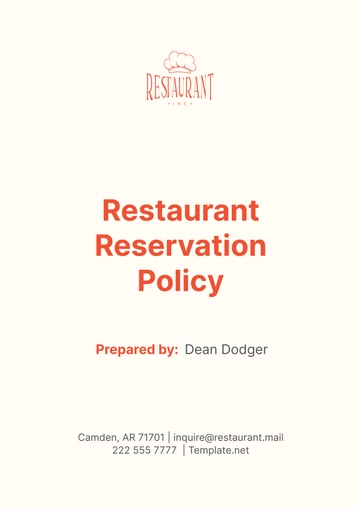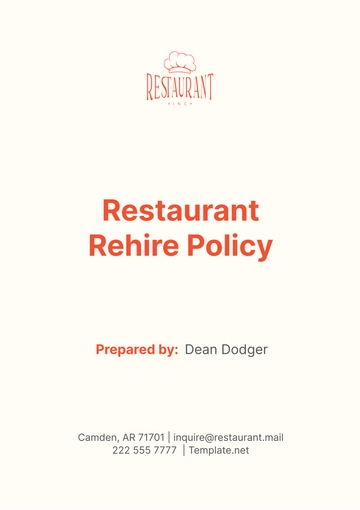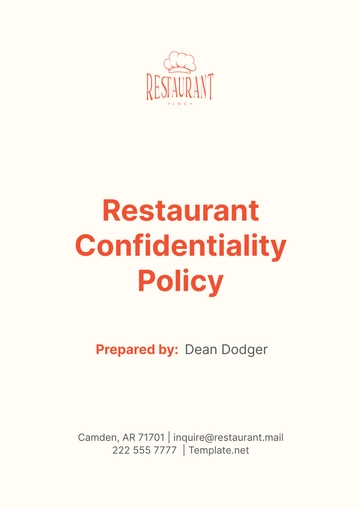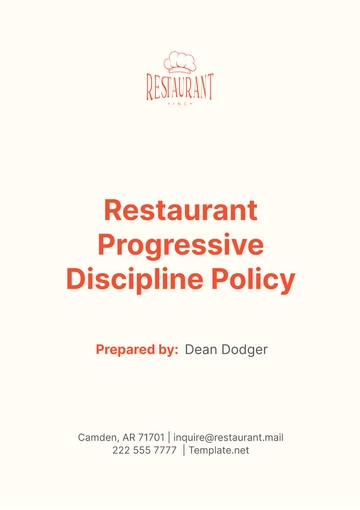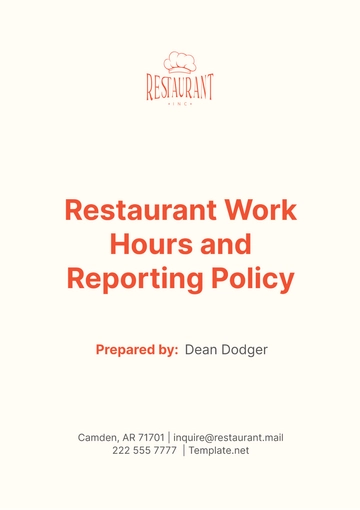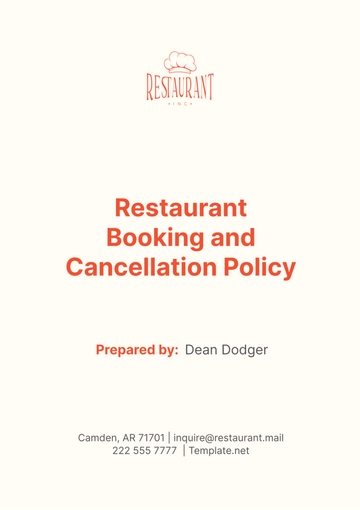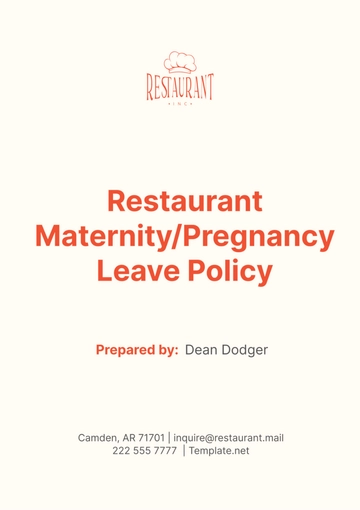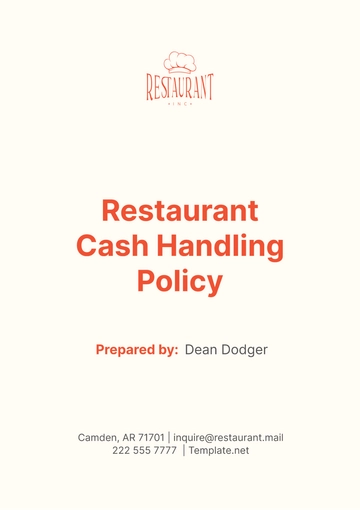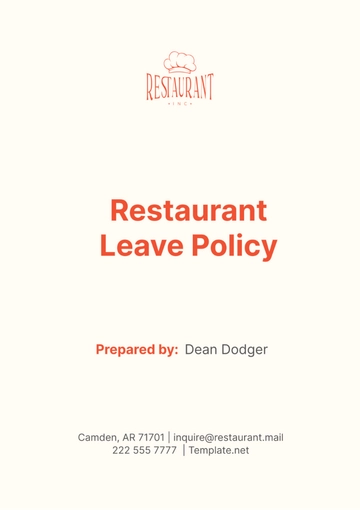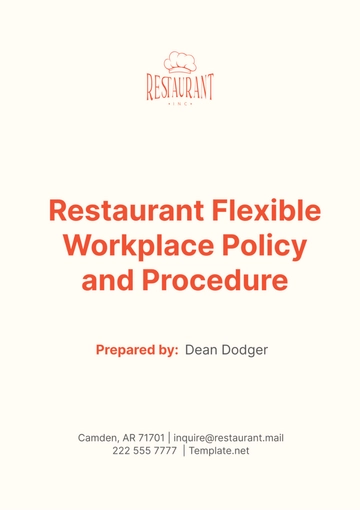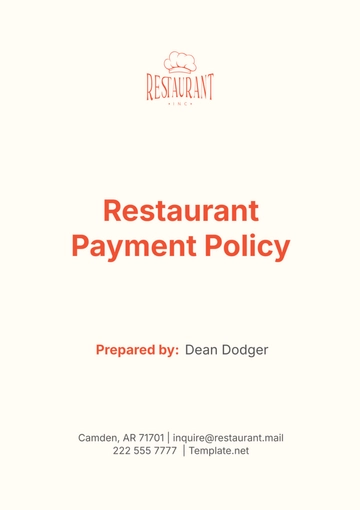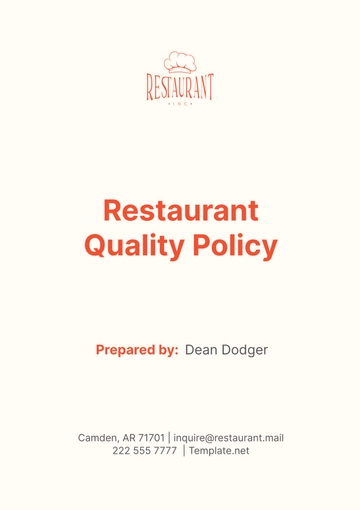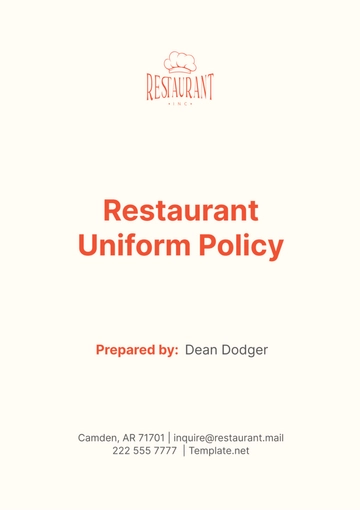Free Restaurant No Tipping Policy
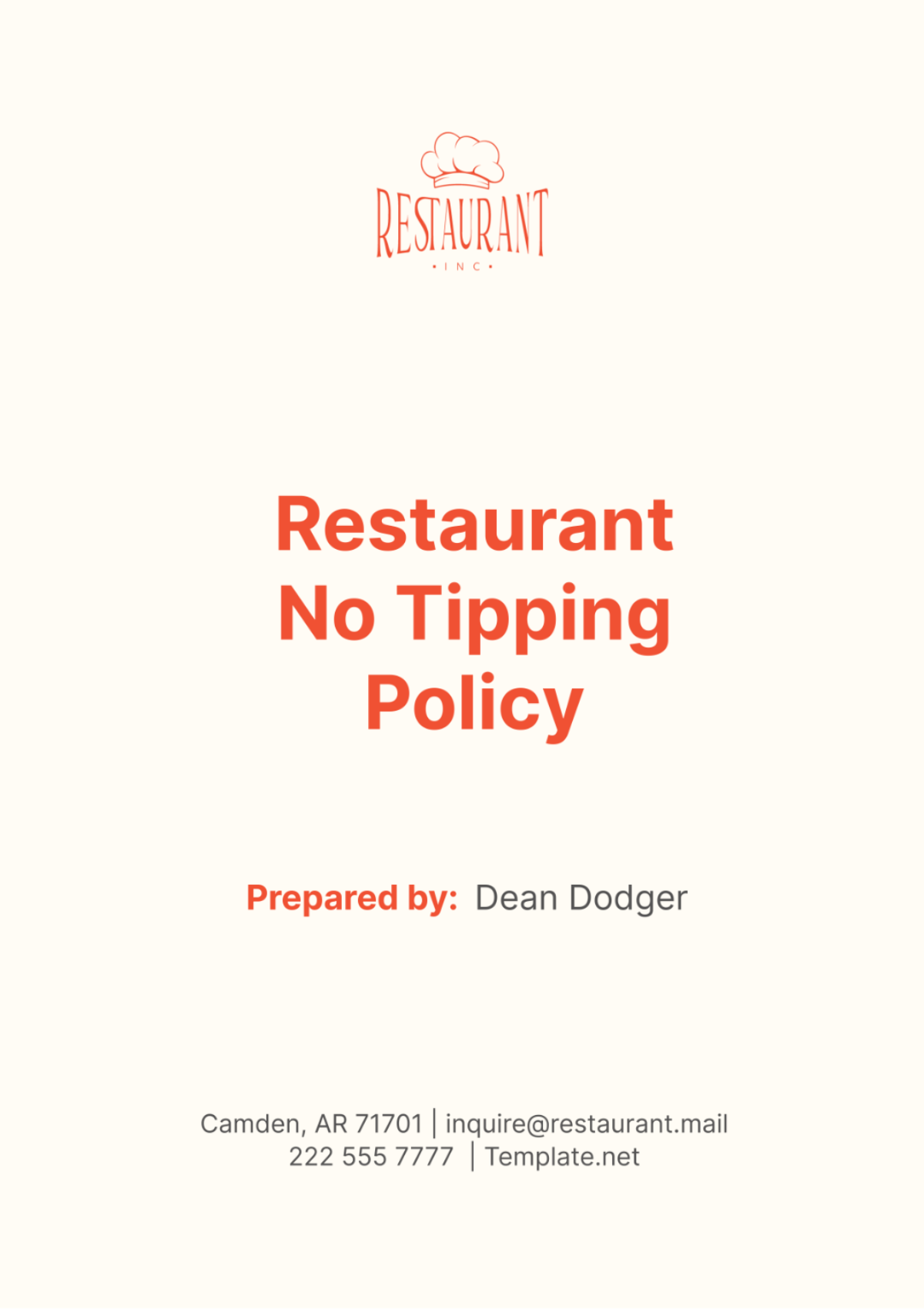
Effective Date: [Month Day, Year]
1. Purpose
The purpose of the Restaurant No Tipping Policy is to ensure a fair wage system within our establishment by eliminating traditional tipping and replacing it with a service charge or higher wage structure. This policy promotes transparency and simplicity in billing, supports equitable pay for all staff members, and contributes to a team-oriented environment where service excellence is everyone's responsibility. Ultimately, it aims to improve employee satisfaction and customer experience by standardizing compensation and removing the variability associated with tips.
2. Scope
The No Tipping Policy at [Your Company Name] is a comprehensive framework designed to ensure fairness and transparency in all customer transactions and staff compensation. This policy is applicable to all levels of staff, from front-of-house teams to back-of-house personnel, as well as management.
It is also relevant to our customers, who are expected to adhere to the policy during their dining experience. The implementation of this policy affects every transaction within the restaurant to maintain a consistent approach to service and payment that aligns with our commitment to equity and clarity.
3. Policy Details
The Policy Details section of [Your Company Name]'s No Tipping Policy outlines three fundamental changes: the implementation of a mandatory 18% service charge to replace tipping, a revised wage structure ensuring fair compensation, and equitable revenue distribution among staff. This comprehensive approach promotes transparency, enhances employee financial stability, and supports a team-oriented environment, ensuring all staff benefit equitably from their collective efforts.
3.1 Service Charge Implementation
To streamline the dining experience and ensure equitable compensation for our staff, [Your Company Name] has instituted a mandatory service charge of 18% on all bills, replacing traditional tipping. This charge is non-negotiable and is implemented to simplify transactions and improve wage consistency across all staff roles. For transparency, the service charge will be prominently displayed on all menus and bills. This approach ensures that customers are aware of the billing structure upfront, preventing any surprises and maintaining trust through clear communication.
3.2 Wage Structure Modification
With the elimination of tipping, [Your Company Name] has revised the wage structure to better reflect the contributions of our staff. Under the new policy, front-of-house employees will receive a minimum hourly wage of $25, while back-of-house staff will be compensated with a minimum of $20 per hour. These adjusted wages are intended to compensate for the absence of tip income and are complemented by any existing benefits, such as health insurance or paid leave, thereby enhancing job satisfaction and financial stability for all employees.
3.3 Revenue Distribution
The revenue collected from the service charge will be distributed among employees based on an equitable model that accounts for hours worked and specific job roles. This ensures a fair allocation of funds, reflecting the contributions of both front-of-house and back-of-house staff. The distribution model is designed to promote a team-oriented approach, where all employees benefit from the success of the service provided, reinforcing our commitment to fairness and team cohesion.
4. Responsibilities
The successful implementation of the No Tipping Policy relies on the cooperation and understanding of all restaurant stakeholders.
a. Employees: All employees must familiarize themselves with the details of this policy and incorporate its principles into their daily operations. Compliance with the wage and service charge guidelines is expected from every team member to ensure consistency and fairness.
b. Management: Management holds the critical responsibility of overseeing the application of the service charge on all bills and ensuring accurate distribution of the generated revenue among staff. Managers are also tasked with providing ongoing education about the policy to both new and existing staff and handling any inquiries from customers regarding billing changes.
c. Customers: Customers play a vital role by respecting the no-tipping policy. Understanding that the service charge fully compensates the staff allows guests to appreciate the efforts of the employees without the need for additional tipping. Customer awareness and cooperation are essential for the smooth acceptance and operation of this new policy.
5. Communication and Training
Effective communication and thorough training are essential for ensuring that all stakeholders understand and embrace the No Tipping Policy. [Your Company Name] is committed to a smooth transition through the following structured approach:
a. Employee Training: Comprehensive training sessions will be conducted for all employees to explain the new wage structure and the rationale behind the elimination of tipping. These sessions will cover the details of the policy, including how service charges are implemented and distributed, and the benefits this model offers to staff and customers alike.
b. Customer Information: To keep our customers well-informed, clear communication materials will be developed and distributed. These will include flyers and in-menu inserts that explain the no-tipping policy, detailing the service charge and how it benefits the staff. This transparency aims to preempt any confusion and ensure customer buy-in.
6. Compliance and Monitoring
To maintain the integrity and effectiveness of the No Tipping Policy, [Your Company Name] will implement rigorous compliance and monitoring strategies:
a. Policy Review: Management will conduct regular reviews of the policy to assess its impact on the restaurant’s operations and stakeholder satisfaction. These reviews will consider various metrics, including employee feedback and customer satisfaction scores, to determine if the policy is meeting its intended goals.
b. Adjustments and Improvements: Based on the outcomes of these reviews, necessary adjustments will be made to the policy. This could involve modifications to the service charge percentage, changes to the wage distribution model, or improvements in customer communication strategies to better meet the needs of all parties involved.
c. Handling Violations: Any violations of the policy by employees, such as soliciting tips from customers, will be addressed promptly and effectively. Disciplinary actions may be taken depending on the severity and frequency of the violations. This ensures that the policy is upheld consistently and fairly across the entire organization.
7. Employee Feedback Mechanisms
To ensure that the No Tipping Policy is continuously refined and responsive to the needs of our staff, [Your Company Name] has established robust mechanisms for gathering and addressing employee feedback:
a. Regular Surveys: Conduct regular surveys to gather comprehensive feedback from employees regarding their satisfaction with the wage structure and overall work environment. This will help identify areas that may require adjustments or additional support.
b. Open Forums: Host open forum discussions where employees can openly share their experiences and suggestions regarding the policy. These forums promote a culture of openness and inclusivity, ensuring that all voices are heard and considered.
c. Suggestion Box: Implement a suggestion box, both physical and digital, to allow employees to anonymously submit their thoughts and feedback on the policy. This ensures that employees feel safe and encouraged to provide honest input.
8. Customer Feedback Collection
Customer feedback is crucial in evaluating the impact of the No Tipping Policy on the dining experience. To effectively gather and utilize this feedback, [Your Company Name] will employ the following methods:
a. Feedback Forms: Provide customers with feedback forms at the end of their dining experience to gauge their satisfaction with the service and their understanding of the no-tipping policy.
b. Online Reviews Monitoring: Regularly monitor online reviews and social media channels to capture customer opinions and responses to the policy. This real-time feedback can provide valuable insights into customer perceptions and areas for improvement.
c. Follow-up Calls or Emails: For larger catering events or reservations, follow-up calls or emails will be sent to collect detailed feedback on the customer’s experience, focusing on their reaction to the service charge and overall service quality.
9. Policy Transparency and Public Relations
Maintaining transparency and proactive public relations is key to fostering understanding and acceptance of the No Tipping Policy among the broader public:
a. Public Statements: Issue public statements through press releases or social media to explain the reasons behind the no-tipping policy and how it benefits both employees and customers.
b. Marketing Materials: Develop marketing materials that highlight the positive aspects of the policy, such as increased wage stability for employees and simplified payment processes for customers. These materials should be distributed across various media platforms to reach a broad audience.
c. Community Engagement: Engage with the local community through events or partnerships to promote the benefits of the no-tipping policy. This engagement can help build support and understanding within the community, reinforcing the restaurant's commitment to fair and transparent business practices.
10. Contact Information
If you have any questions or need further clarification regarding the Restaurant No Tipping Policy, please contact us at:
Email: [Your Company Email]
Phone: [Your Company Number]
Thank you for your cooperation and support in making this initiative a success.
- 100% Customizable, free editor
- Access 1 Million+ Templates, photo’s & graphics
- Download or share as a template
- Click and replace photos, graphics, text, backgrounds
- Resize, crop, AI write & more
- Access advanced editor
Discover a professional, seamless way to communicate your restaurant's no-tipping policy with Template.net's customizable Restaurant No Tipping Policy Template. This editable template ensures clarity and consistency across your establishment. Easily customizable and editable in our AI Editor Tool, it's designed to meet your specific needs. Start utilizing this essential resource today to foster transparency and customer satisfaction.
You may also like
- HR Policy
- Restaurant Policy
- Company Policy
- Accounting Policies and Procedures
- Website Policy
- Privacy Policy
- Safety Policy
- School Policy
- IT and Software Policy
- Law Firm Policy
- Construction Policy
- Interior Design Policy
- Travel Agency Policy
- Education Academic Policy
- Security Policy
- Real Estate Policy
- Expense Policy
- Software Policy


